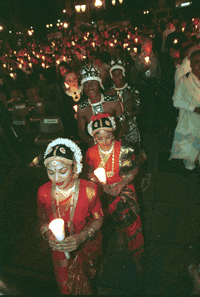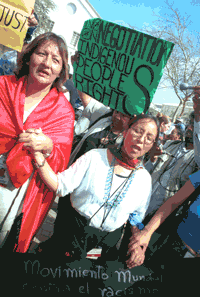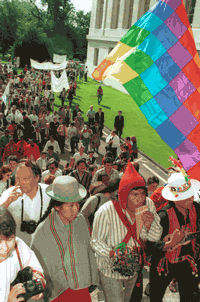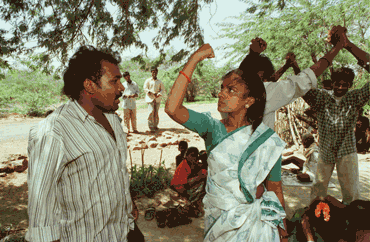
"The range of issues and the intensity of the debates on racism are a dramatic challenge to the churches worldwide. When we know racism to be a sin, do we give our work against racism the priority it needs?" Question asked by Bishop Mvumelwano Dandala, leader of the WCC delegation to WCAR at the NGO Forum on 31 August 2001 (Press release) At this conference, Palestine became what apartheid in South Africa was for the world in the past. Palestine has become an issue that unites the different human rights groups. But it is important to emphasize that criticism of Israel does not signal any kind of antisemitism. We firmly maintain all our statements against antisemitism. The holocaust must not be equated with Palestine. But our attitude to Palestine signifies an important moral decision which includes us among the voices of the NGO families in the world." Marwan Bishara, Palestinian member of the WCC delegation to a consultation on Israel and Palestine (September 2001) Press release It is urgent for us and our churches to acknowledge our complicity with and participation in the perpetuation of racism, slavery and colonialism, or we are not credible. This acknowledgment is critical because it leads to the necessary acts of apology and confession, of repentance and reconciliation, and of healing and wholeness. All of these elements form part of redress and reparations that are due the victims of racism, past and present." 5 September 2001 statement of the Ecumenical Caucus at the World Conference against Racism (Press release) What did the governments do for the recognition of the self determination of indigenous peoples? They went backwards. They took away the 's' of 'peoples' - a very political little letter that represents the whole question of territory and land. In having with us journalists committed to the ecumenical movement and the struggles for justice of so many peoples, it was good to know that our words and our commitments were in the hands of people who were going to convey our message in a just and fair way - over against the Western and the secular media." Marilia Schüller, comments after Durban It is time that UNAIDS and other UN agencies further recognized the tremendous potential of churches and faith-based organizations and involved them in the planning, implementation and monitoring of HIV/AIDS programmes at local, national and international level. In the WCC, we recognize that church leadership needs to mobilize communities to equip them not only to take care of the sick and suffering, but also to prevent the spread of HIV/AIDS." Manoj Kurian before the Special Session of the UN General Assembly on HIV/AIDS, New York, June 2001. (Press release) I am standing here for Rev. Gideon Byamugisha, an Anglican priest from Uganda who is living with HIV/AIDS. He was supposed to speak on behalf of our delegation but unfortunately today he fell ill and is unable to be with us. I would like us all to remember Rev. Gideon in our thoughts and prayers. Out of respect for life, proven methods of preventing HIV/AIDS, including abstinence, e.g., in the form of delayed sexual activity in young people, faithfulness in sexual relationships and the use of condoms, must be promoted and supported. I would like to dismiss the widespread myth that all churches and religious organizations are against the use of condoms. The WCC with its 342 member churches all around the world has adopted an official policy acknowledging the use of condoms as one option in the prevention of HIV transmission." Christoph Benn, leader of a four-member team that followed the Special Session, in a statement delivered to the UN General Assembly on the final day, 27 June 2001 (Press release) Our difficulty in addressing issues of sex and sexuality has often made it painful for us to engage in any honest and realistic way with issues of sex education and HIV prevention." WCC, November 2001 HIV/AIDS consultation in Kenya "The ecumenical community is challenged not only by HIV/AIDS itself, but also by the ambivalence of many church representatives. While pastors on the ground are dealing daily with life and death issues, church leaders are not giving consistent messages." William Temu, WCC News, December 2001 "We have felt the anguish of Africa... Nearly 10,000 people are newly infected each day. We have been inspired by the courage and dignity of people living with HIV/AIDS. We have confessed our silence as the church and our actions that have contributed to the spread of the disease and death." Sam Kobia, director of the WCC Issues and Themes cluster, at the HIV/AIDS consultation (Press release) |
YEARBOOK 2002: THE CHURCHES AND SOCIETY Consistent with its commitment to address social issues, the World Council of Churches (WCC) was an enthusiastic participant in the United Nations conference against racism held in Durban, South Africa, 31 August-7 September 2001. The gathering had a broad agenda, as indicated by its title: "World Conference against Racism, Racial Discrimination, Xenophobia and Related Intolerance". In preparation for the role it would play in Durban, the WCC had considered the same themes in regional meetings. These culminated in South Africa, 19-24 June, as WCC representatives met with churches and partner agencies about the continuing legacy of apartheid and its global significance. The WCC sent a delegation of some 35 people to the pre-world conference forum of non-governmental organizations (NGOs) in Durban, with representatives selected from groups able to bring special perspectives to the issues: Palestinians, Africans and others of African descent, indigenous peoples, youth, women and advocates of the rights of the Roma/Sinti. Following the NGO forum, eight WCC representatives remained in Durban for the intergovernmental world conference itself.
In Durban, the WCC sought to strengthen its collaboration with other groups to confront racism worldwide. This approach became ever more important as the conference came to be mired in controversy. Many government delegations were concerned about efforts to label Israel as racist, reviving the debate of the 1970s when some attempted to equate Zionism with racism. The WCC had argued against this view at that time and in Durban reiterated its stance. The Council's representatives also supported adoption of provisions condemning antisemitism. At the same time, they supported Palestinian demands that their people's rights and claims for justice be recognized. Another issue arousing much debate in Durban was that of reparation and compensation for victims of slavery and the slave trade. Despite the resistance of some governments, the final conference statement acknowledged that "slavery and the slave trade, including the transatlantic slave trade, were appalling tragedies in the history of humanity not only because of their abhorrent barbarism but also in terms of their magnitude..." The statement would "further acknowledge that slavery and the slave trade are a crime against humanity and should always have been so..." Discussions at the world conference have given new impetus to the quest to understand the dynamics of restorative and transformative justice. "This is new ground we are exploring," said Marilia Schüller, a WCC staff member who worked with the Durban delegation. "It is no longer sufficient merely to record past injustices. We must search for ways to restore the lives and dignity of those who were victims." The ecumenical caucus at the conference, made up of representatives of religious bodies including the WCC delegation, held a press conference at a crucial moment in the intergovernmental proceedings. South African Archbishop Desmond Tutu argued passionately for governments to make a fresh start by sending "a message of hope to the world". Representatives from many churches gathered in Durban for an ecumenical service of commitment to oppose racism. This was followed by a candlelight march to the Durban city hall. One of the disappointments of Durban was the conference's failure to identify indigenous peoples as the subject of institutional racism, according to WCC staff member Eugenio Poma. "The topic is still under negotiation," he said, adding that "in 2001, for the first time, the UN structure includes a Permanent Forum for Indigenous Peoples. The WCC is doing advocacy work within the permanent forum, focusing particularly on issues of land and spirituality among indigenous populations and on the empowerment of indigenous communities."
While the international conference on racism was a major focus for the year, the WCC maintained its regular programme in a variety of ways. The WCC Programme to Combat Racism continues to include grants to organizations actively opposing racism. A total of about US$70,000 was given in 2001 to ten organizations in Australia, Brazil, Colombia, the Dominican Republic, Slovakia, Scotland and Nepal. In 2001, the WCC also conducted research into church-sponsored initiatives dealing with racism and xenophobia in Great Britain, France, Germany and Austria. Resources were brought to bear in 2001 to fulfill one of the stated objectives of the WCC special focus on Africa, the promotion of dialogue between church, civil society and the state in Africa. The main issues addressed were the agenda and methodology for the dialogue. Support was given to the regional fellowships of councils and churches, and to BEACON (Building Eastern African Community Network) to respond to the emerging economic and political initiatives in Africa. Consultations dealing with this work identified the urgent need for a positive but critical partnership between the church and state. "More specifically," noted Sam Kobia, director of the WCC Cluster on Issues and Themes, "the participants in consultations held at Kampala, Uganda, in May and Nairobi, Kenya in July dealt with the church response to NEPAD, the New Partnership for Africa's Development." NEPAD, to be formally launched in Durban, South Africa, in July 2002, is an initiative for economic emancipation spearheaded by some political leaders in Africa. When the United Nations convened a special session on HIV/AIDS in June 2001, the WCC sent a four-person delegation to follow the deliberations in New York. The ecumenical team was encouraged to organize two side events during the special session, presenting an agreed joint statement on HIV/AIDS by faith-based organizations; the delegation was finally invited to address the special session on how faith-based groups could be utilized effectively in the struggle against HIV/AIDS. The WCC was also active in a widespread series of regional workshops and consultations on the danger of HIV/AIDS.
|
||||||




